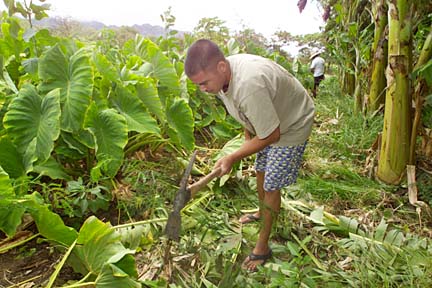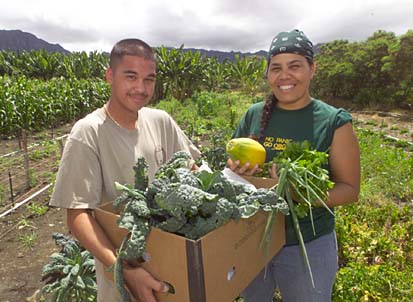
DENNIS ODA / DODA@STARBULLETIN.COM
Emanuel Miles uses a pick to get at tough weeds between the taro and banana plants that grow at the Waianae Mala 'Ai 'Opio nonprofit farm, which provides healthy food and farming skills and helps out the low-income community.
Farm helps grow
young leadersThe Waianae project raises organic
produce while teaching culture
Bright green lettuce pokes out of the dirt in neat rows in Waianae. Violet eggplants delicately hang from twisting vines. Tall onions grow like a green fence in the rich soil.
Undeterred by the scorching sun, Gary Maunakea-Forth and three young farmers are hunched over, determined to wrestle the invading weeds out of the kalo patch.
The five-acre Mala 'Ai 'Opio (MA'O) nonprofit farm, run by the Waianae Community Re-Development Corp. with funding from the Office of Hawaiian Affairs, is more than an oasis of organic vegetables: It's a place where recent high school graduates can work part-time growing vegetables to sell at a new natural food cafe in Waianae and learn about agriculture, Hawaiian culture, leadership and communication.
For the project coordinators, the farm molds Waianae's youth into leaders while providing jobs and fresh produce to the community. For the young people, it is a building block to start college or their own farm or business, and be role models for others.
"There's a lot of missed opportunity for kids in Waianae to become leaders," Maunakea-Forth said. "Here, they get 10 months of real leadership with all kinds of work: They have to solve problems, be in a chaotic environment and be co-managers."
The students agree and would rather be outside, working the land they grew up to love, than be in an office, they said.
Groggy-eyed, the students arrive at the farm about 7 a.m. They chant "E Ho Mai," asking for guidance, and begin harvesting and planting. When it becomes too hot to work, they retreat to the shade to learn about pest management, conflict resolution and soil science, or fill out financial aid forms for college scholarships through Ke Ali'i Pauahi Foundation of Kamehameha Schools. Kupuna often stop by to share their knowledge and stories.
DENNIS ODA / DODA@STARBULLETIN.COM
Miles and Kukui Maunakea-Forth hold a box full of kale that will be taken to Kokua Market on King Street to sell.
Solomon Enos, project assistant and son of farmer and paniolo Eric Enos, loves to teach the students about their cultural ties to land. "Lualualei Valley is birthplace of the island. ... We have a connection to Haloa, our older brother kalo, and what we grow is who we are," he reminds the students, showing them the blood-red sap that drips from the lehua-variety kalo when cut.
"I thought it was going to be boring, but it's good fun," said Brian Lawe, 20. "I picked up a sense of pride because I'm giving back to my community."
In a community with two McDonald's within minutes of each other, the students are trying to teach their friends about eating better, including avoiding fast food.
They don't eat at McDonald's anymore, they said. Their main focus is eating healthier, and they are reaching people through the Aloha Aina Cafe -- a favorite place to eat, said 19-year-old Emanuel Miles.
The cafe sells the organic produce to the community in a open market on Saturdays and offers "ono-kine healthy food six days a week for breakfast and lunch." Students interested in culinary arts work part-time in the cafe, blending smoothies with the farm-grown bananas and papayas.
Kaleo "Bumper" Johnson, general manager, says the cafe's popularity is growing, and kupuna often come to sit and play music, staying for lunch.
Johnson doesn't think the hardest part is getting people to try the food, but rather "getting people to slow down and enjoy their food."
Project manager Kukui Maunakea-Forth said she knows that the Waianae community can slowly taste the difference between the fresh farm produce and what they buy at Safeway and Sack 'n Save. "They come in and say, 'Eh, this is pretty good.'"
Along with offering the organic produce at the cafe, the farm sells pounds of green onions, cilantro, bananas, romaine lettuce and other produce to Kokua Market on King Street.
For Miles, seeing his produce in the store made all the long hours in the dirt worth the work. "I wanted to tell everyone there, 'Hey, I grew that,'" Miles said.
After graduating from Waianae High school, Kanoe Burgess was interested in archaeology and didn't even like to eat vegetables. Now, she has graduated from the MA'O program and will help the next 11 students.
She values her new role as a leader and was shocked when kids at a Queen Lili'uokalani Children Center program chose her to be their role model.
"I was touched because I thought I wasn't that important to them," she said. "I'm proud. I'm doing something good ... but I can do more."
In August, Gary and Kukui will hand out shovels to the next group of students. They are still looking for Waianae or Nanakuli students to join the program. Students receive a stipend, health insurance, a 10 percent discount at Aloha Aina and lots of produce for the 10 months. Interested students should call Kukui at 864-9485.
And as the sign at Aloha Aina Cafe says, "Eh, no panic -- go organic."

